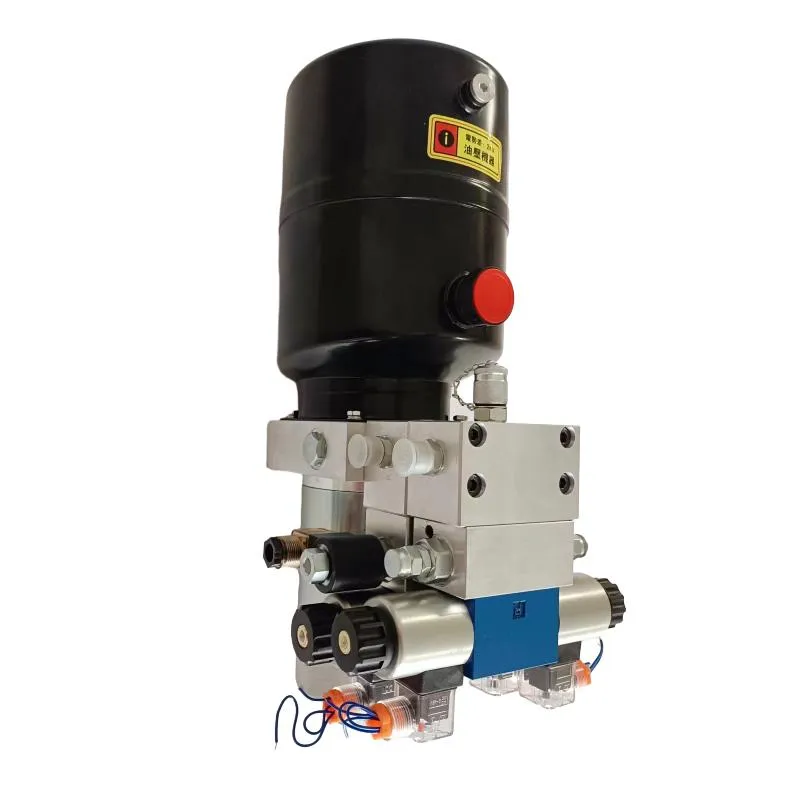Jul . 31, 2024 02:40 Back to list
Efficient Hydraulic Cylinder Pump Solutions for Enhanced Performance in Industrial Applications
Understanding Hydraulic Cylinder Pumps A Comprehensive Overview
Hydraulic systems play a pivotal role in various industries, providing the power needed for a multitude of applications through the use of pressurized fluids. Among the critical components of hydraulic systems are hydraulic cylinder pumps, which serve as the heart of these systems, converting mechanical energy into hydraulic energy. This article delves into the structure, function, and applications of hydraulic cylinder pumps, shedding light on their importance in contemporary machinery and equipment.
What are Hydraulic Cylinder Pumps?
Hydraulic cylinder pumps are devices designed to generate a flow of hydraulic fluid, which is then directed to hydraulic cylinders. These cylinders convert the hydraulic energy back into mechanical energy, creating linear motion for moving heavy loads. The pump operates on the principle of Pascal’s law, which states that a change in pressure applied to an enclosed fluid is transmitted undiminished throughout the fluid. As a result, even a small amount of input power can be transformed into a significant output force, making hydraulic cylinder pumps exceptionally efficient for heavy-duty applications.
Types of Hydraulic Pumps
Hydraulic cylinder pumps come in various types, each suited to specific applications
1. Gear Pumps These are common in hydraulic applications, where two or more gears rotate to draw in fluid and expel it at high pressure. Gear pumps are simple in design and provide a consistent flow rate, making them ideal for general-purpose hydraulic systems.
2. Piston Pumps Known for their efficiency and high pressure capabilities, piston pumps use the reciprocating motion of pistons within cylinders to move fluid. These pumps are particularly useful in applications requiring variable flow and high pressure.
3. Vane Pumps Employing sliding vanes within a rotor, vane pumps perform well in low to moderate pressure applications. They are known for their smooth operation and are often used in mobile machinery.
Applications of Hydraulic Cylinder Pumps
Hydraulic cylinder pumps are integral to various sectors, demonstrating their versatility and efficiency
. Some common applications includehydraulic cylinder pump product

- Construction Machinery From excavators to bulldozers, hydraulic pumps enable the lifting and moving of heavy materials, increasing productivity on construction sites.
- Manufacturing Equipment Hydraulic presses and other industrial machines utilize hydraulic pumps to facilitate metal forming, assembly, and material handling processes.
- Agricultural Equipment Tractors and harvesters rely on hydraulic systems powered by cylinder pumps to operate attachments and lift loads efficiently.
- Automotive Industry Hydraulic brakes, steering systems, and lifts in automotive repair shops showcase the vital role of hydraulic pumps in ensuring safety and operational efficiency.
Advantages of Hydraulic Cylinder Pumps
1. High Power-to-Weight Ratio Hydraulic systems can deliver significant forces with relatively small components, making them ideal for applications where space and weight are critical considerations.
2. Precision Control Hydraulic pumps allow for precise control of speed, force, and direction, enabling operators to perform tasks with high accuracy.
3. Durability and Reliability Designed to withstand heavy usage, hydraulic pumps offer long-term reliability with proper maintenance, ensuring consistent performance in demanding environments.
Conclusion
Hydraulic cylinder pumps are fundamental to the efficiency and effectiveness of hydraulic systems across a wide range of industries. Their ability to generate immense power from a compact design makes them indispensable in numerous applications, from construction to manufacturing and beyond. Understanding the different types of hydraulic pumps and their specific applications can help in choosing the right equipment for any project, ensuring optimal performance and productivity. As technology continues to advance, the evolution of hydraulic systems and their components, including cylinder pumps, will undoubtedly enhance their functionality and efficiency further.
-
Fork Lift Power Units - Hebei Shenghan | Efficiency, Reliability
NewsJul.13,2025
-
1.5-Ton Turbocharged Cylinder-Hebei Shenghan|Hydraulic Solution,Energy Efficiency
NewsJul.13,2025
-
Auto Hoist Power Units-Hebei Shenghan|Efficiency&Industrial Lifting
NewsJul.13,2025
-
Double Acting Power Units-Hebei Shenghan|Hydraulic Solutions,Industrial Efficiency
NewsJul.13,2025
-
1.5 Ton Lifting Cylinder 70/82-40-290-535 - High-Performance Hydraulic Solution | Hebei Shenghan
NewsJul.13,2025
-
Fork Lift Power Units - Hebei Shenghan | Efficiency&Reliability
NewsJul.13,2025
